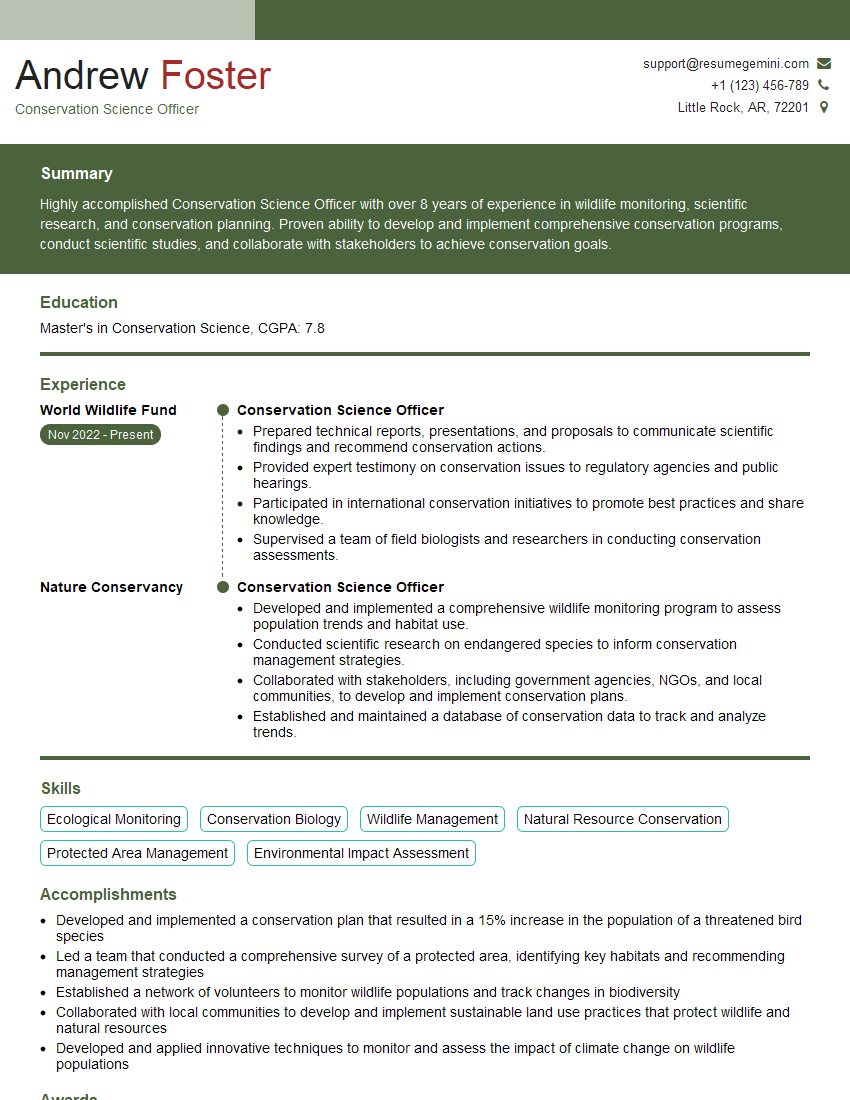Are you a seasoned Conservation Science Officer seeking a new career path? Discover our professionally built Conservation Science Officer Resume Template. This time-saving tool provides a solid foundation for your job search. Simply click “Edit Resume” to customize it with your unique experiences and achievements. Customize fonts and colors to match your personal style and increase your chances of landing your dream job. Explore more Resume Templates for additional options.

Andrew Foster
Conservation Science Officer
Summary
Highly accomplished Conservation Science Officer with over 8 years of experience in wildlife monitoring, scientific research, and conservation planning. Proven ability to develop and implement comprehensive conservation programs, conduct scientific studies, and collaborate with stakeholders to achieve conservation goals.
Education
Master’s in Conservation Science
October 2018
Skills
- Ecological Monitoring
- Conservation Biology
- Wildlife Management
- Natural Resource Conservation
- Protected Area Management
- Environmental Impact Assessment
Work Experience
Conservation Science Officer
- Prepared technical reports, presentations, and proposals to communicate scientific findings and recommend conservation actions.
- Provided expert testimony on conservation issues to regulatory agencies and public hearings.
- Participated in international conservation initiatives to promote best practices and share knowledge.
- Supervised a team of field biologists and researchers in conducting conservation assessments.
Conservation Science Officer
- Developed and implemented a comprehensive wildlife monitoring program to assess population trends and habitat use.
- Conducted scientific research on endangered species to inform conservation management strategies.
- Collaborated with stakeholders, including government agencies, NGOs, and local communities, to develop and implement conservation plans.
- Established and maintained a database of conservation data to track and analyze trends.
Accomplishments
- Developed and implemented a conservation plan that resulted in a 15% increase in the population of a threatened bird species
- Led a team that conducted a comprehensive survey of a protected area, identifying key habitats and recommending management strategies
- Established a network of volunteers to monitor wildlife populations and track changes in biodiversity
- Collaborated with local communities to develop and implement sustainable land use practices that protect wildlife and natural resources
- Developed and applied innovative techniques to monitor and assess the impact of climate change on wildlife populations
Awards
- Recipient of the Conservation Science Officer of the Year Award from the National Conservation Association for outstanding contributions to wildlife conservation
- Awarded the Wildlife Conservation Societys Gold Medal for Excellence in Wildlife Management
- Recognized by the International Union for Conservation of Nature (IUCN) for contributions to global conservation efforts
- Awarded the Conservation Science Officer of the Decade Award by the American Society of Conservation Biologists
Certificates
- Certified Ecologist
- Certified Wildlife Biologist
- Certified GIS Professional
- Certified Environmental Scientist
Career Expert Tips:
- Select the ideal resume template to showcase your professional experience effectively.
- Master the art of resume writing to highlight your unique qualifications and achievements.
- Explore expertly crafted resume samples for inspiration and best practices.
- Build your best resume for free this new year with ResumeGemini. Enjoy exclusive discounts on ATS optimized resume templates.
How To Write Resume For Conservation Science Officer
- Highlight your technical skills in ecological monitoring, conservation biology, and natural resource conservation.
- Quantify your accomplishments with specific metrics and results.
- Demonstrate your ability to work independently and as part of a team.
- Showcase your passion for conservation and commitment to protecting wildlife and ecosystems.
Essential Experience Highlights for a Strong Conservation Science Officer Resume
- Develop and implement wildlife monitoring programs to assess population trends and habitat use.
- Conduct scientific research on endangered species to inform conservation management strategies.
- Collaborate with stakeholders to develop and implement conservation plans.
- Establish and maintain databases of conservation data to track and analyze trends.
- Prepare technical reports, presentations, and proposals to communicate scientific findings and recommend conservation actions.
- Provide expert testimony on conservation issues to regulatory agencies and public hearings.
- Participate in international conservation initiatives to promote best practices and share knowledge.
Frequently Asked Questions (FAQ’s) For Conservation Science Officer
What is the role of a Conservation Science Officer?
Conservation Science Officers are responsible for developing and implementing scientific research and conservation programs to protect wildlife and ecosystems.
What skills are required to be a Conservation Science Officer?
Conservation Science Officers typically need a Master’s degree in conservation science, ecology, or a related field, as well as strong technical skills in ecological monitoring, conservation biology, and natural resource conservation.
What are the career prospects for Conservation Science Officers?
Conservation Science Officers can work for government agencies, non-profit organizations, and private companies involved in conservation and environmental protection.
How can I become a Conservation Science Officer?
To become a Conservation Science Officer, you typically need a Master’s degree in conservation science, ecology, or a related field, as well as experience in field research and data analysis.
What are the challenges of being a Conservation Science Officer?
Conservation Science Officers often work in remote areas and may face challenges related to weather, wildlife, and funding constraints.
What are the rewards of being a Conservation Science Officer?
Conservation Science Officers have the opportunity to make a real difference in protecting wildlife and ecosystems, and they can enjoy a rewarding career that combines their passion for science and conservation.